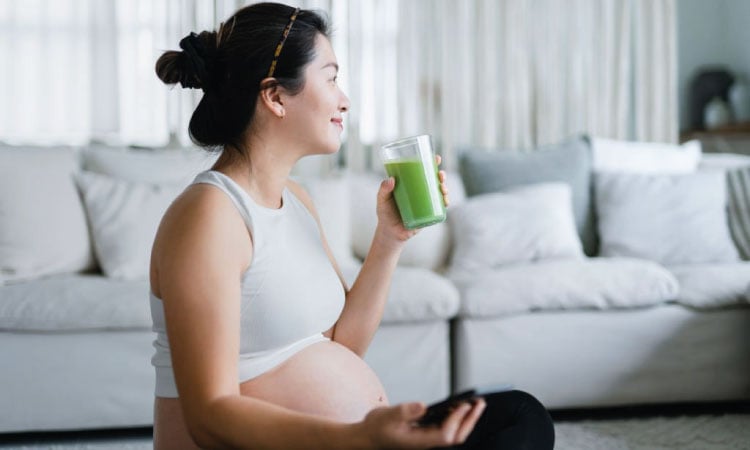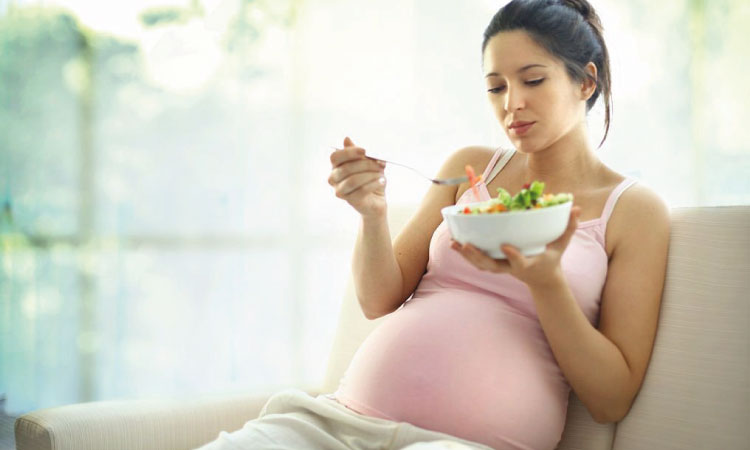A woman’s body needs certain nutrients to function at its best and successfully carry a baby to term during pregnancy. One of the vital minerals that is essential during pregnancy is Potassium. Consuming foods rich in potassium during pregnancy is essential, as potassium deficiency has been shown to harm the development of the fetus. In this post, we will discuss why potassium is an essential nutrient during pregnancy, how it affects a pregnant mom’s body, can potassium cause abortion, how to include more potassium in your diet, and how high or low levels of potassium can affect you and your unborn child.
What Is Potassium?
Potassium is an essential mineral for the human body. Without it, the body would not function properly. The body requires potassium to maintain fluid balance and electrolyte balance. Nerve impulses and muscle contraction depend on potassium as well. Potassium plays a role in regulating the heartbeat as well. Potassium also helps transport nutrients into cells and waste products out of them. A potassium-rich diet can help to counter the effects of sodium on blood pressure.
Potassium isn’t naturally produced by our bodies. We obtain it by eating potassium-rich foods. High blood pressure, constipation, fatigue, and muscle weakness can all result from potassium deficiency. Even a small variation in potassium level may affect our health. This mineral maintains the electrical activity of our cells. Cells with high electrical activity – like nerves, muscles, and the heart – suffer when this level drops.
Why Is Potassium Important During Pregnancy?

As one of the seven essential macro minerals, potassium is essential for human health. It is necessary for several key processes during pregnancy. Maintaining optimal potassium levels during pregnancy is very important. Potassium levels that are low or high during pregnancy are associated with adverse effects and can lead to unintended complications.
- Helps to relieve swelling: It’s normal for pregnant women to experience swelling and fluid retention during pregnancy. Getting enough potassium is an excellent way to reduce swelling. Sodium intake is one of the factors that contribute to fluid retention and edema during pregnancy. By counteracting sodium’s effects, potassium prevents fluid build-up and swelling
- Balances electrolytes: Your blood volume expands significantly during pregnancy. This can result in a substantial difference in electrolyte concentrations in the three trimesters. In order to keep the expanded blood volume in the right chemical balance, you will require slightly more electrolytes (sodium, potassium, and chloride) during pregnancy. Therefore, it is important to consume potassium-rich food during pregnancy1
- Helps to relieve leg cramps: Leg cramps are a common complaint in the second and third trimesters of pregnancy and usually occur at night. Check whether you’re getting enough potassium if you’re experiencing leg cramps during pregnancy. Potassium deficiency may cause leg cramps. Regular consumption of potassium-rich foods could help prevent leg cramps during pregnancy2 along with these recommended home remedies for leg cramps during pregnancy
- Regulates blood pressure: It is important to maintain healthy blood pressure during pregnancy. Both high blood pressure and low blood pressure are equally dangerous during this time. Taking in too much sodium may raise your blood pressure3. Consuming more potassium makes you lose more sodium in the urine. Aside from this, potassium also lowers blood pressure by relaxing blood vessel walls
- Enhance immunity: Every cell in the body contains potassium. The cellular processes that regulate immunity are powered by potassium. It is essential for neutralizing the acids formed during digestion. The gut lining can be weakened by an acidic digestive system, which compromises the immune system. Pregnant women commonly experience electrolyte imbalances. These imbalances can weaken the immune system. Potassium helps address this problem4
Related Reading: 11 Simple Ways To Boost Immunity During Pregnancy
How Much Potassium Can A Pregnant Woman Have?
The ideal amount of potassium is 4,000 mg/day for pregnant women5. Never take potassium supplements during pregnancy without a physician’s approval. Excessive potassium intake can have a harmful effect on pregnancy. It is just as dangerous to have too much potassium in your body as to have too little. It is advisable to let the doctor determine your potassium requirements based on your natural potassium levels. He will let you know whether you can get it from food or if you need to take supplements.
How Can I Ensure I Get Enough Potassium During Pregnancy?
During pregnancy, a healthy diet is the best way to obtain adequate potassium. This mineral is found in a variety of foods, especially fresh fruits and vegetables. It is recommended that you consume a well-balanced diet that includes potassium-rich foods if you wish to keep your potassium levels stable during pregnancy. It may be beneficial to work with a registered dietitian in order to determine what foods are high in potassium and which of these foods you should incorporate into your pregnancy diet.
Food sources of potassium include:
Calculate Due Date With LMP
1. Avocado
Avocados during pregnancy are renowned superfoods that are loaded with vitamins and minerals crucial for pregnancy. One avocado provides approximately 15% of your daily potassium need. 100 grams of avocado contains 485 mg potassium6. They’re also rich in vitamin K and folate. Eating one avocado a day during pregnancy is a healthy step during pregnancy.
2. Potato
One of the most concentrated and affordable sources of potassium is potatoes7. Potatoes baked with the skin on are the best option, as the skin contains much of the potato’s potassium. The potassium content of one medium baked potato with skin is 620 mg. Bananas, spinach, and broccoli contain less potassium than baked potatoes. The dangers of extra sodium can be avoided by using the salt-free seasoning on baked potatoes.
3. Sweet Potato
Eating sweet potatoes during pregnancy is absolutely safe as they are powerhouse of nutrients. 100 grams of sweet potato contains nearly 475 mg of potassium, approximately 15 percent of the recommended daily amount8. In addition to containing more protein than regular potatoes, sweet potatoes are also a great source of fiber, iron, vitamins, and minerals that are beneficial during pregnancy.
Related Reading: Top 10 Protein-Rich Foods For Pregnancy
4. Beans
Beans, in general, contain a substantial amount of potassium, whether they are kidney beans, pinto beans, or lima beans. 100 grams of adzuki beans have around 1224mg of potassium9. 100 grams of Pinto beans have around 1393 mg of potassium10. Edamame and lentils contain a lot of potassium, too.
5. Banana

Bananas are rich in fiber and potassium. One medium banana contains about 358 milligrams of potassium11. This is about 8% of the daily recommended intake. However, the cooking bananas have slightly more potassium in them. Dried bananas contain four times more potassium than fresh bananas. The concentration of potassium doesn’t increase during cooking; rather, it becomes more concentrated as moisture levels fall. The plantain, a relative of bananas, is also high in potassium. Consuming a banana every day may contribute to regulating blood potassium levels, but one must be also aware of the reasons to avoid bananas during pregnancy.
6. Sun-dried tomatoes
Tomatoes are a good source of potassium. One medium tomato has 292 mg of potassium. The potassium content of a cup of tomato juice is 534 mg. The potassium content of one cup of tomato paste is 908 mg12. A cup of sun-dried tomatoes contains 1850 mg of potassium, which is 36 percent of the amount recommended for pregnant women13.
In addition to being high in potassium, sun-dried tomatoes are also high in fiber, calcium, vitamin C, and protein, which makes them particularly beneficial during pregnancy.
7. Coconut water and coconut milk
Staying hydrated during pregnancy is also crucial to maintaining potassium levels. Use coconut water or milk to maintain potassium levels. There are 600 milligrams of potassium in one cup of coconut water14, compared to 497 mg of potassium in the same quantity of coconut milk15. Drinks made from coconuts contain a wide range of vitamins and minerals as well. Coconut water and milk are both rich in saturated fat as well. This food is also packed with dietary fiber that may help to keep the digestive system healthy. Magnesium, a mineral that promotes sleep and reduces muscle cramps, is found in significant quantities in these coconut products. Intake of coconut water is therefore very beneficial during pregnancy.
8. Juices from certain fruits and vegetables
Heathy & refreshing juices during pregnancy is a big yes, every time however there are some varieties of juice that contain a high amount of potassium. It must be made, however, without added sugar to reap its benefits in all aspects.
A cup of the following juices can raise potassium levels.
- ABC juice (apple-beetroot-carrot)
- Tomato juice
- Pomegranate juice
- Tangerine juice
- Orange juice
Fruits and vegetables are the best sources of potassium. You should include them each day in your diet to ensure you have adequate potassium. If your doctor tells you to take potassium supplements, be sure to follow their directions with the correct dosage. Ask your doctor if potassium-rich foods should be limited while you are taking supplements.
Can High Potassium Affect Pregnancy?
High potassium levels are extremely dangerous during pregnancy. It can cause,
- Miscarriages
- Premature delivery
- A condition called Hyperkalemia can lead to fatal outcomes such as kidney failure or cardiac arrest
Effect Of Low Potassium In Pregnancy
There is a wide variety of foods that contain this important mineral, so it is not common to have low potassium levels. Potassium deficiency is usually caused by chronic vomiting or diarrhea, or by taking certain diuretics.
A lack of potassium can lead to weakness, fatigue, cramps, constipation, and abnormal heart rhythms. You must contact your healthcare provider as soon as possible if you suspect that you are deficient in potassium or any other nutrient during pregnancy.
Related Reading: 10 Danger Signs Of Pregnancy To Watch Out For
Risks And Precautions

High potassium levels during pregnancy can be an independent risk factor for future atherosclerotic complications (hardening and narrowing of arteries)16. This is the primary risk associated with high potassium intake during pregnancy.
Precautions
Here are a few tips to keep in mind when adding potassium to your diet.
- In case of low potassium levels, you should never take supplements without consulting your doctor. Potassium imbalances are extremely dangerous
- It is important not to exceed a doctor’s recommendation when taking supplements
- During pregnancy, your doctor may prescribe the correct potassium supplement dosage, and you need to be cautious when taking it. Supplements taken in an uncontrolled manner can cause heart conditions such as abnormal heart rhythms or palpitations
- When planning your diet, don’t just focus on potassium. This might cause you to neglect other nutrients
- Physical activities with low potassium levels should be avoided during pregnancy as they can complicate your pregnancy
A nutritionist can help you draw up a meal plan with the help of your doctor when adding potassium to your diet. A balanced diet shouldn’t be overly dependent on one mineral. Find out how to plan your diet when you’re pregnant by talking to your nutritionist.
FAQs
Potassium levels during pregnancy vary based on the stage of pregnancy. In the first trimester, the normal range is anywhere between 3.6 mmol/L to 5 mmol/L.
During the second and third trimesters it is 3.3 mmol/L to 5 mmol/L, and 3.3 mmol/L to 5.1 mmol/L respectively. In general, doctors consider a range of 4.4 mmol/L of potassium a safe range to maintain throughout pregnancy.
At this point, ‘the question can you take potassium pills while pregnant’ must have crossed your mind. Yes, you can take them, as long as you follow the recommended doses that your doctor prescribes and consult with him before you begin.
However, potassium-rich foods are considered a safer option, as an overdose is less likely.

